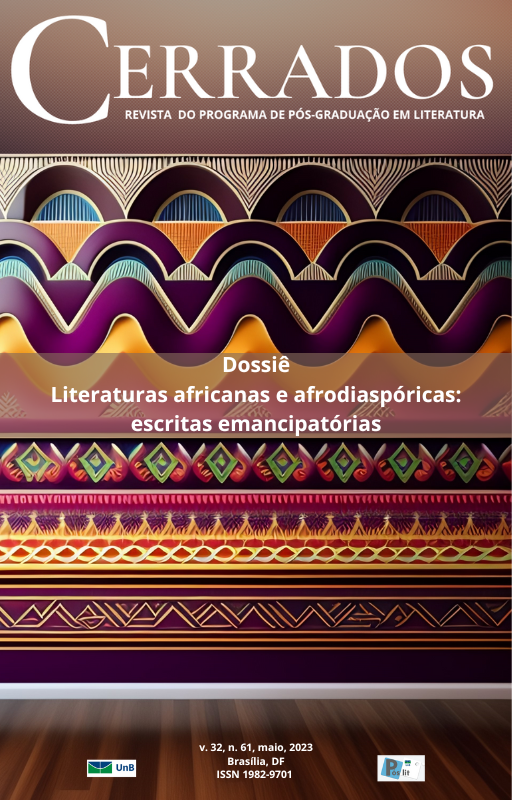Exemplary Exceptions
the singularity of Sojourner Truth and Jarena Lee and the nineteenth-century American society
DOI:
https://doi.org/10.26512/cerrados.v32i61.45864Palabras clave:
Sojourner Truth, Jarena Lee, Excepcionalidade, EstereótiposResumen
This text aims at understanding Sojourner Truth and Jarena Lee’s paradoxical exceptional label according to what has been registered in their (auto)biographies and to how they have been portrayed and referred to in nineteenth-century newspapers. From this we investigate the constructedness of race and stereotypes by white hegemonic powers and expose how these women dismantled exceptionality as a necessary superior/inferior comparative form.
Referencias
ANDREWS, William L. To tell a free story: the first century of Afro-American autobiography, 1760 - 1865. Urbana, Illinois: University of Illinois Press, 1988.
ANDREWS, William L.; FOSTER, Frances Smith; HARRIS, Trudier (Org.). The concise Oxford companion to African American literature. New York: Oxford University Press, 2001.
COOGAN, Michael David et al. The new Oxford annotated Bible New Revised Standard version: an ecumenical study Bible. [S.l: s.n.], 2018. Disponível em: <http://www.vlebooks.com/vleweb/product/openreader?id=none&isbn=9780190276058>. Acesso em: 7 maio 2020.
COOPER, Anna J. A voice from the South. New York: Oxford University Press, 1988. (The Schomburg library of nineteenth-century Black women writers).
FITCH, Suzanne Pullon; MANDZIUK, Roseann M. Sojourner Truth as orator: wit, story, and song. Westport, Conn: Greenwood Press, 1997. (Great American orators, no. 25).
GILBERT, Olive; TRUTH, Sojourner. Narrative of Sojourner Truth. New York, N.Y: Penguin Books, 1998.
GILBERT, Sandra M.; GUBAR, Susan (Org.). The Norton anthology of literature by women: the traditions in English. 3rd ed. New York: W.W. Norton & Co, 2007. v. 1.
HALL, Stuart (Org.). Representation: cultural representations and signifying practices. London; Thousand Oaks, Calif: Sage in association with the Open University, 1997. (Culture, media, and identities).
JACKSON, Francis. New England Anti-Slavery Convention. The Anti-Slavery Bugle, Salem, Columbiana Co. Ohio, 15 jun. 1850. p. 2.
KILOMBA, Grada. Plantation memories: episodes of everyday racism. 2. Auflage ed. Münster: Unrast, 2010.
KNOPPERS, Laura Lunger (Org.). The Cambridge companion to early modern women’s writing. New York: Cambridge University Press, 2009. (Cambridge companions to literature).
LEE, Jarena. Religious Experience and Journal of Mrs. Jarena Lee (1849). In: HOUCHINS, SUE E (Org.). Spiritual Narratives. New York: Oxford University Press, 1988. p. 97.
M., C. L. Sojourner Truth. The Anti-Slavery Bugle, Salem, Columbiana County, Ohio, 21 jan. 1860. p. 2.
PAINTER, Nell Irvin. Sojourner Truth: a life, a symbol. New York, NY: Norton, 1996.
PILLSBURY, Parker. Anti-Slavery in Bainbridge - Unusual Falsehood and Meanness in the Presbyterian Church. The Anti-Slavery Bugle, Salem, Columbiana Co. Ohio, 25 out. 1851. p. 2.
Sidney Poitier, Mike Brown, and the Myth of Black Exceptionalism. [S.l: s.n.]. Disponível em: <https://celluloidinblackandwhite.blogspot.com/2015/01/sidney-poitier-mike-brown-and-myth-of.html?sc=1668885299539#c8205085261727378912>., 11 jan. 2015
SOANES, Catherine; STEVENSON, Angus (Org.). Concise Oxford English dictionary. [Updated] 11th ed., rev ed. Oxford; New York: Oxford University Press, 2008.
WALKER, Alice. In search of our mothers’ gardens: womanist prose. Orlando: Harcourt, 2004. (A Harvest book).
WINKS, Robin. The Making of a Fugitive Slave Narrative: Josiah Henson and Uncle Tom - A Case Study. In: DAVIS, CHARLES TWITCHELL; GATES, HENRY LOUIS (Org.). The slave’s narrative. 1. as an Oxford Univ. Pr. paperback ed. Oxford: Oxford Univ. Press, 1990. p. 112–146.
ZARKOV, Dubravka. Black lives matter: A short note on exceptionality. European Journal of Women’s Studies, p. 135050682097910, 17 dez. 2020.
Descargas
Publicado
Número
Sección
Licencia
Derechos de autor 2023 Revista Cerrados

Esta obra está bajo una licencia internacional Creative Commons Atribución 4.0.
Proibida a reprodução parcial ou integral desta obra, por qualquer meio eletrônico, mecânico, inclusive por processo xerográfico, sem permissão expressa do editor (Lei n. 9.610 de 19/2/1998 )



